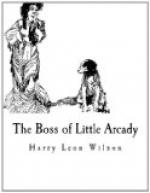Then we strolled down the quiet street to a road that went close to the railway. And there, with beating hearts, we beheld the two-twenty Eastern freight rattle superbly by us. From the cab of its inspiring locomotive one of fortune’s favorites rang a priceless gold bell with an air of indifference which we believed in our hearts was assumed to impress us. And notwithstanding our suspicion, we were impressed, for did we not know that he could reach up his other hand and blow the splendid whistle if he happened to feel like it?
After the locomotive came the closed and mysterious box-cars, important with big numbers and initials in cabalistic sequence, indicating a wide and exciting range of travels. Then came stock cars, from between the slats of which strange and envied cattle looked out on their way to a wondrous city; and there was a car of squealing pigs, who seemed not to want to ride on a real train; and some cars of sheep that were stupidly indifferent about the whole thing. At the last was a palatial “caboose”, and toward this, over the tops of the moving cars, a happy brakeman made his exciting progress, not having to hold on, or anything. He casually waved an arm at us, a salute that one of our number, in acknowledging, sought to imitate, for the cool, indifferent flourish of its arm, as if it were a common enough thing for us to be noticed by the mighty from their eminences.
This was my namesake’s most beautiful of butterflies. Any one could understand that. As the train lost itself in smoke I knew well what he felt. I knew that that smoke of soft coal was so delicious, so wonderful of portent in his nostrils, that throughout his life it would bring up the wander-bidding in him—always a strange sweet passion of starting. Even now the journey-wonder was in his eyes. I knew that he saw himself jauntily stepping the perilous tops of cars, clad in a coat of padded shoulders bound with wide braid, a lantern on his arm, coal dust smudging the back of his neck, and two fingers felicitously gone from his left hand.
I coughed, to recall him from visions. He looked up at me, a little shyly, debating—but why should it not be told?
“Uncle Maje—when I grow up, I’m going off to be a brakeman.”
“I know it,” I said quietly.
“Won’t it be just fine!”
“It’s the very finest life in all the world. I hoped for it myself once, but I was disappointed.”
He gave me a quick look of sympathy.
“Wouldn’t they let you?”
“Well, they were afraid I’d be hurt—only I knew I wouldn’t be—anything to speak of—a couple of fingers, perhaps—”
“Off the left hand,” he suggested understandingly.
“Of course,—off the left hand.”
“That brakeman on No. 3 has got two off his left hand,” was the final comment.
We retraced our steps; but there was yet another butterfly of my namesake’s. He led us to a by-path that followed the river bank up to the bridge, running far ahead of us. When we reached him he was seated, dumb with yearning, before a newly painted sign,




